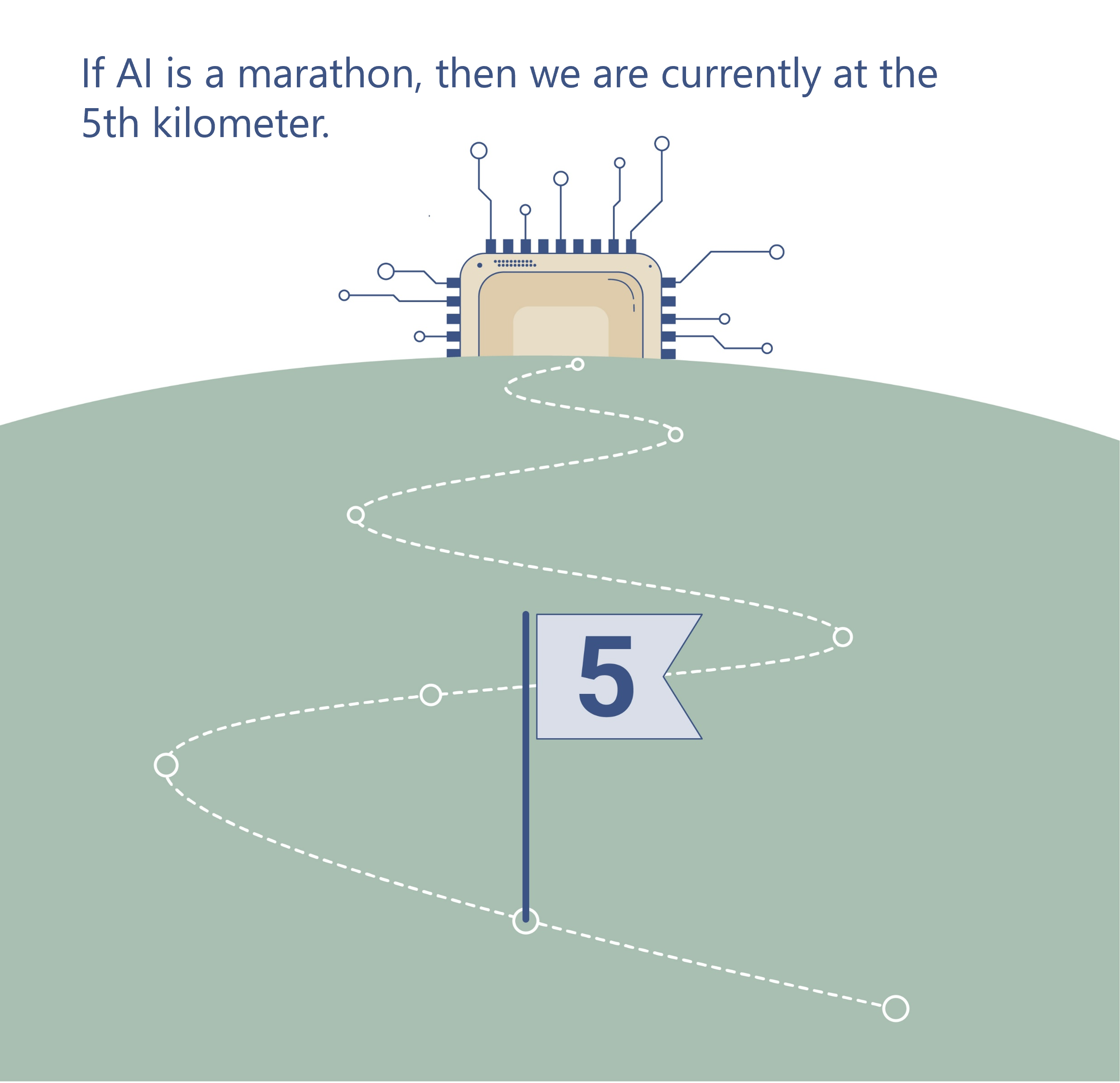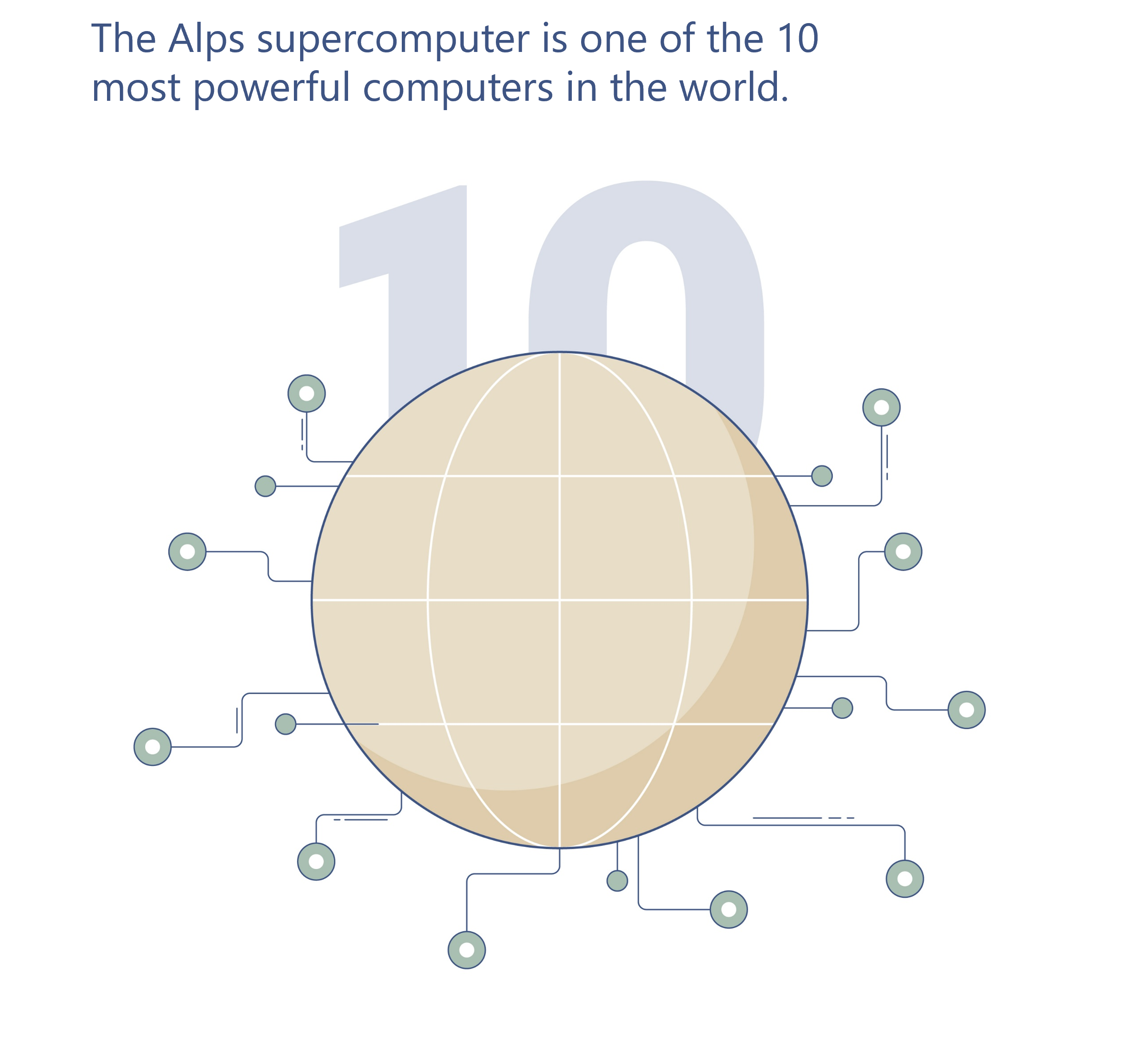PD Dr. Alexander Ilic, Co-Founder and Executive Director ETH AI Center in dialog with Fabian Forrer, IFBC Sector lead Technology

At the ETH AI Center, PD Dr. Alexander Ilic pursues the goal of bringing together interdisciplinary research with real-world applications and positioning Switzerland as a global leader in trustworthy, responsible AI. PD Dr. Alexander Ilic is particularly interested in how AI technologies can have not only a technical but also an economic impact. In late summer 2025, the publicly developed large language model APERTUS was released, which was created under the leadership of the ETH AI Center and EPFL in collaboration with the Swiss Supercomputing Centre (CSCS).
At the Zurich AI Festival and the AI+X Summit – the annual highlight of the ETH AI Center – the AI community discusses Switzerland's role in the global AI landscape and the opportunities and risks that Artificial Intelligence (AI) brings for the economy and society. IFBC asked PD Dr. Alexander Ilic how the Swiss economy can successfully shape its AI transformation and what he believes will be “the next big thing” in the field of ArtificiaI Intelligence (AI).
In dialog with Fabian Forrer, IFBC Sector lead Technology, Alexander Ilic provides insights into his work at ETH Zurich and explains how technology transfer between science and industry should be approached.
If AI is a marathon, then we are currently at the 5th kilometer. As with all technological disruptions, it is a misconception that access alone will change anything. With the internet, the fact that I had a connection did not make much difference. Productivity gains came from the “Digital First” and “Mobile First” approaches. The same applies to AI. The use of ChatGPT gives the impression that we have already arrived. Many companies are taking small, initial steps to learn what the new technology can do and how to use it. There is great potential for value creation in the interaction between human and artificial intelligence. However, in order to unleash the innovative power of AI, core processes and business models must be renewed using “AI First”.

The reluctance of companies is largely due to uncertainty about what happens to data when using a foundational AI model. The major foreign providers are currently still not trustworthy enough, and then there is the geopolitical situation with the US and China. It is also crucial that no biases of a social, cultural, or technical nature arise in the training of AI. That is why APERTUS is a breakthrough for Switzerland and will accelerate technological change in the country.
APERTUS is an independent, trustworthy foundational model without bias, which inspires a great deal of confidence. It even lowers the overall barrier to entry for Swiss SMEs to AI. It is important to understand that all foundational models – especially foreign ones – are in a downward price spiral and margins are thinning as the cost of creating them continues to decline and competition increases. In the near future, these will become a commodity without competitive advantages. APERTUS was designed as a public good. Value creation then takes place at the higher layers in applications, business models, and sectors. Switzerland has a huge opportunity here because it means that parts of the value chain can be relocated back to our country in certain areas. There will be shifts here.

The question of "Make or Buy" is not trivial. In my opinion, companies do not necessarily have to be “First Movers”. We saw this with the transition from analog to digital photography: other providers quickly caught up. In the beginning, many companies make mistakes, and only a few are confident that the business case will pay off in the end. When it comes to coding (programming), AI is three to ten times more efficient, but you first have to recognize what changes with the use of AI and how much this costs or saves in the long term. The efficiency gains are offset by the costs of procurement and follow-up work such as quality control and error correction. Ultimately, you have to be able to stand behind the product. Not only will the use of AI initially strain the IT budget, but the transformation will also tie up human and financial resources that will have to be paid back. Anyone who wants to develop an “AI First” company today must expect high investments. “First Follower” approaches and joint learning through collaboration with AI start-ups are currently more promising.
This can certainly make sense – also in order to understand the significance of AI for one's own business and to gain initial experience. In addition, approaches such as external incubators can contribute to success in dealing with new technologies. In any case, this approach is better than becoming too dependent on third parties. This is especially true if one achieves significant AI learning effects with one's own data, because this is what creates the actual and significant increase in value. From time to time, you should ask yourself: How much do third parties benefit and can I get out of it? When AI takes off, it changes a company's core processes and business model.
There is Sam Altman's bet on the one-person unicorn (unicorn = valuation of ≥ $1 billion). The question is not whether it will happen, but when. Many things can be achieved today with fewer people. To develop a new business idea or prototype, all you need today is a small team of the right people and light coding (simple programming work). However, in order to move forward and scale up, more know-how and more human resources are needed. Combining human and artificial intelligence to create human AI has many advantages. On the one hand, humans are important for contributing best practices, validating data, correcting errors, and making final decisions. When developing autonomous driving, for example, it could be exciting to learn from the data of five-star drivers how to improve AI, rather than relying solely on simulations. On the other hand, employees learn from AI, creating a reinforcing system.
It is important for the Swiss economy to build up a critical mass. We have around 800 experts who are already capable of building so-called frontier AI models, and we train around 50-100 more every year at ETH Zurich. Talent is extremely scarce in this field, and we need to provide the next generation with the best possible conditions. The Alps supercomputer has shown how important it is to have enough GPUs in order to be competitive. We don't need the most powerful computers in the world, but we do need a very high level of computing power to keep up. That's why Switzerland has pooled the resources of ETH, EPFL, and CSCS. There are also many international providers in Zurich and the surrounding area because we provide a wealth of knowledge and talent through ETH. In some cases, tech giants poach entire teams from each other, offering sums of money more comparable of football transfers. If there is a "bubble" in the AI market, it is because there is too little talent in the area. M&A can also be used to build expertise.

The value of an AI application is influenced by many factors, such as accuracy, cost-benefit ratio, learning ability, etc. We pay close attention to feedback loops, i.e., how strongly each individual user influences the system through their interactions and how noticeable the improvement is the next time. Overall, the AI application must generate data in order to improve and build a defensible lead. Larger foundation models also play a role as pioneers. ETH is currently working on such models in the areas of health, education, and finance. These sectors have great potential.
As a board member or member of senior management, you need to understand whether an “AI First” competitor is emerging. This refers to a company that does not scatter small AI initiatives across its organization but rather uses “AI First” to redesign its core processes. It is also important to develop a responsible regulatory framework, but without putting Switzerland at a disadvantage compared to other countries. We have good examples of dialog-oriented innovation platforms in Switzerland in the areas of drones and crypto. The next productivity boost is expected when AI moves away from computers and onto robots and mobile devices. It will be exciting to see what follows when AI not only responds to input from computers but can also constantly observe what is happening and improve itself on that basis. In my opinion, this will be "the next big thing." The Swiss have only just entered this new era, and we are paving the way for the future with our Zurich AI Festivals and the AI+X Summit.
.png)
PD Dr. Alexander Ilic (right) is the Executive Director of the ETH AI Center in Zurich and a leading expert at the interface of research, entrepreneurship, and social responsibility in the field of artificial intelligence. After completing his doctorate at ETH Zurich and working as an entrepreneur, including as co-founder and CEO of Dacuda (sold to Magic Leap), he now combines academic excellence with practical implementation.
Fabian Forrer (below) is a Partner and Sector lead Technology at IFBC. With his experience and expertise, he supports technology companies, medium-sized and capital market-ready companies from various sectors, and private equity investors in the areas of corporate finance, public and non-public M&A, and financing.